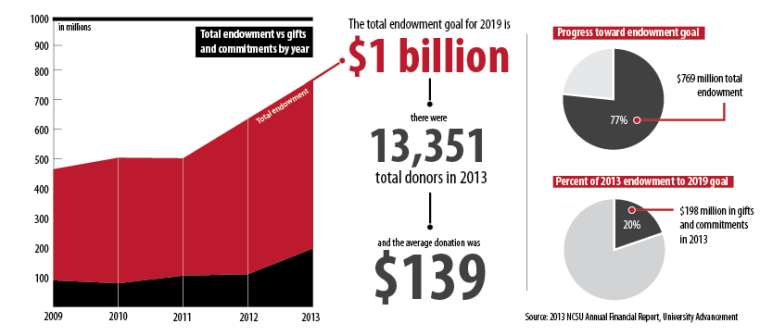N.C. State raised nearly $200 million in gifts for 2013, beating the total for 2012 by 78 percent.
According to a University Advancement report, the school collected $198,214,355, with a goal of a $1 billion endowment by 2019.
Through smaller gifts, the Annual Giving office raised $1,604,166 from alumni, parents, students and friends in 2013. A total of 13,351 donors gave an average of $139, according to Ann Horner, the executive director of the N.C. State Annual Fund.
In 2013, the University received three eight-figure gifts and pledges, according to University Advancement. Prestage Farms was one of three such donors, and its gift endowed the Department of Poultry Science.
Horner said there are two types of gifts: major gifts and minor gifts. Minor gifts are usually paid in a lump sum while the major gift requires a more serious commitment, such as the Park Scholarship.
Horner said annual giving helps to pay for new lab equipment, recreating curriculum and hiring new faculty members.
“Since N.C. State is a research university, it is critical that we are cutting edge and state of the art, and that’s very costly,” Horner said.
Horner said one of the main reasons that giving is at a record high is because people are becoming comfortable with the economy and the job market.
“I would say the feeling of giving in our country is in a better place; the conversation about jobs across the state and nationwide factors in, and it gives people a feeling of plenty. People feel comfortable sharing,” Horner said.
Horner said the annual giving office stresses reaching out to alumni individually according to additional factors such as age and the activities they were involved in while attending the University.
“We treat our younger alumni differently than someone who is celebrating their 50th anniversary,” Horner said. “It’s called segmentation; we want to talk to audiences in a way that’s pertinent to them.”
Horner said many alumni who give $1,000 or more to N.C. State become a member of the Chancellor’s Circle, which includes a mix of faculty members, staff and alumni.
According to the Chancellor’s Circle webpage, members get invited to special events for the year that they donate in. Members can become fellows or partners by donating $2,500 or $5,000 respectively.
Carlo Laurore, the associate director of gift planning, said he works to secure legacy gifts, which typically involve endowments that help the University during a long period of time.
“Planned giving involves gifts that are a bit more complicated than receiving cash outright.” Laurore said. “It provides donors the opportunity to create endowments and give to impact the future of N.C. State.”
One of the main factors that increased the amount is emphasizing to donors how the gifts affect students and the N.C. State community, Laurore said.
“Alumni and donors really care about the students, and they want to know how the gifts have impacted the students,” Laurore said. “We’ve taken a keen focus on highlighting legacy gifts, and we increased the marketing to share just how good our students are.”
Laurore also said another strategy the Office of Gift Planning has employed is getting involved in activities around the campus.
“One of the other things we’ve done is we’ve engaged in some of the programmatic things that are going on around campus so we can shake hands and get to know our students, so that when we talk to donors, we actually have real stories on students that are doing great things,” Laurore said.
Laurore said the Office of Gift Planning helps to increase the endowment of the University and hopefully increases the number of student scholarships in the future.
Annual giving to the University is typically generated from the disposable income of the givers, Horner said.
“This is the type of giving that you write out of your checkbook, usually disposable income, if you’ve got extra money and you provide loyal support for mostly expendable items at the University such as funding an academic enterprise, or possibly a new scholarship,” Horner said.
The sum of donations to colleges has increased substantially in the past year, with most of the money going toward funding student academics and enterprises, according to the Chronicle of Higher Education.








